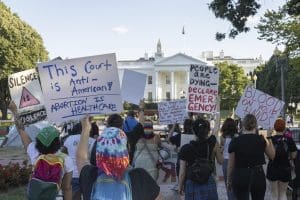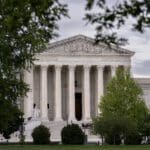Opinion: The abortion bans taking over post-Roe America with costly consequences (Part 1)
An overview of six of the 12 states with strict abortion bans after the Supreme Court’s Dobbs decision shows the drastic effects anti-abortion policies can have.

Since Roe v. Wade was overturned in June, 12 of the 50 states in the U.S. have enacted total abortion bans. These bans will leave millions of people who are pregnant, or could get pregnant, without reproductive autonomy or full access to health care.
Out of these 12 states, nine of them are in the South or Southeast, creating parts of the country where abortions are not only banned in a particular state, but in the nearby surrounding states as well. The other three states are in the Midwest and Northwest.
Here are what abortion bans look like in six of those states:
Alabama
Lawmakers in Alabama voted to pass the so-called “Human Life Protection Act” alongside party lines in May 2019. That was despite only having the support of 31% of Alabama voters, and acknowledging at the time that it would be unenforceable under Roe v. Wade.
Once the Supreme Court issued its Dobbs v. Jackson decision in June, however, the law became enforceable. The law calls for a near-total ban of abortion. The only exceptions are abortions performed if the physical health of the pregnant person is at risk. There are not exceptions related to rape or incest, which are widely accepted, because anti-abortion advocates pushed for a “clean” complete ban that could become the basis of challenging Roe v. Wade.
Greg Albritton, a Republican state senator and a co-sponsor of the Human Life Protection Act, said after the Dobbs decision, “When we get into session, there’s gonna be several amendatory bills to look at means and methods to isolate exemptions in this or some other way to deal with those matters.”
Alabama’s last abortion clinic shut down in June.
Arkansas
Arkansas had a ban set to go into effect the moment Roe was overturned, also known as a “trigger law.” According to Planned Parenthood Great Plains, the ban deprives nearly 700,000 people of reproductive age from access to abortion. Since other states with full bans now surround the state, people may need to travel a distance of hundreds of miles — as far as New Mexico, Colorado, or Illinois — to legally obtain abortion care.
Arkansas law calls for a near-total ban and, like Alabama, has exceptions for saving a pregnant person’s life, but no exceptions for rape or incest. Anti-abortion conservatives in the state are now split on whether they should add those rape and incest exceptions.
Idaho
Idaho has a near-total abortion ban, but following recent litigation by the Department of Justice (DOJ) under the Biden administration, pro-abortion advocates scored a rare, small victory. The DOJ sued the state, alleging Idaho’s anti-abortion law conflicts with the federal Emergency Medical Treatment and Labor Act (EMTALA) law. The EMTALA mandates that hospitals that accept Medicare funding provide whatever medical care is necessary to stabilize someone’s condition in life-threatening situations, like impairment to bodily functions or dysfunction of an organ.
Last week, a federal judge agreed and struck down the portion of Idaho’s ban that would have prevented doctors from providing abortions or related care in emergency situations. Only that part of the law that has been reversed, though, and the ban is otherwise enforceable in the state.
While their law contains exceptions for rape and incest, Idaho vaguely requires that such basis for exceptions must be “proven,” setting up abortion providers for potential criminal liability if such “proof” doesn’t meet a legally provable standard.
Kentucky
Kentucky’s abortion ban has also been the source of litigation. Earlier in August, a state court blocked the ban, deciding it violates the state’s constitution’s right to privacy and self-determination. The state’s conservative attorney general, Daniel Cameron, immediately appealed. His appeal prevailed in the state’s appellate court at the beginning of the month, and that ruling was affirmed by the state supreme court later in August, meaning the ban is currently in effect.
Cameron has heavily advocated for banning abortion, arguing all the way to the United States Supreme Court in support of abortion bans, despite the fact that Kentucky Gov. Andy Beshear is a Democrat who opposes such bans.
Kentucky’s current law has no exceptions for rape and incest. In November, Kentuckians will be able to vote on a ballot measure deciding whether the state constitution should enshrine the right to abortion or not.
Louisiana
Louisiana’s near-total abortion ban is considered one of the worst since Roe was overturned. The state’s strict law has caused confusion among providers, especially those who treat pregnant people with “medically futile diagnoses” — conditions where the fetus fails to develop in a fashion where it will live outside the womb.
Recently, a Louisiana woman’s fetus was diagnosed with acrania, an often-fatal disorder where a fetus’ skull does not develop. Doctors told the woman, Nancy Davis, that the fetus had low chances of surviving through or beyond birth, but she was forced to carry the fetus — “just to bury it” — because acrania was not explicitly on the list of acceptable reasons to perform an abortion in the state.
Louisiana’s law does provide exceptions if the fetus cannot survive birth or to save the life of a pregnant person. Katrina Jackson, the author of the state’s ban said that a Louisiana hospital could have legally performed an abortion in this situation, but Davis’ attorney explained that the legislation’s exception language isn’t clearly-worded enough to assure abortion providers won’t be prosecuted. Doctors inare becoming increasingly concerned that they could face prosecution for providing medications to treat things like depression and migraines if those drugs are also used for reproductive care.
Mississippi
Mississippi passed a 15-week ban “trigger law,” and fought for it all the way to the Supreme Court, resulting in the Dobbs v. Jackson litigation, and giving the Supreme Court the opportunity to overturn Roe v. Wade. After their success, Mississippi’s trigger law kicked in on July 7, 2022.
Mississippi’s law only has exceptions for situations where the life of the pregnant person is in danger, and for rape — given that it is formally reported to law enforcement. (Victims of incest aren’t protected by the rape exception currently.) Not every rape victim will file a police report as victims often feel “shame, fear [and] may be scared to go to the police,” Vara Lyons, an ACLU Mississippi attorney, explained. Trafficking victims, she added, will also be unlikely to report a rape if they face ongoing violence from traffickers.
Mississippi is also surrounded by Louisiana, Alabama, and Tennessee, states with complete bans as well. The last clinic in the state closed the same day as the trigger law went into effect, after they failed to get the complete ban blocked in state court. Workers moved to Las Cruces, New Mexico — a roughly 16-hour drive from Mississippi — to set up shop there.
For many people, it may be near-impossible to have enough money, time, or other resources to travel that far.
Recommended

Rosenblum, other Democratic AGs ask SCOTUS to block red state bans on emergency abortions
Oregon Attorney General Ellen Rosenblum and nearly two dozen other Democratic-led states urged the U.S. Supreme Court to preserve the ability of emergency room doctors to provide abortions, arguing that failing to do so would have devastating effects for their health care systems and women across the country.
By Gloria Rebecca Gomez, Arizona Mirror - April 01, 2024
Ken Paxton paid $2.3 million to defense lawyers for impeachment trial
The lawyers were paid from his campaign, according to a report filed this week.
By Patrick Svitek, The Texas Tribune - January 18, 2024
Texas governor and attorney general do little to curb state’s chemical plant crisis
Republicans Greg Abbott and Ken Paxton have taken thousands of dollars in donations from chemical companies and their affiliated PACs.
By Jesse Valentine - December 08, 2023








































































